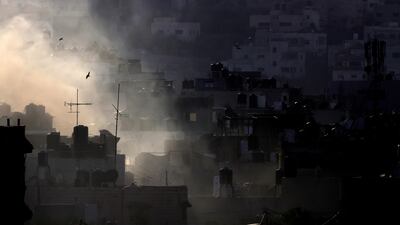Scattered pine trees and olive groves interrupt barren hills just west of the city of Ramallah. In the past decade, rich Palestinians have been building holiday homes in the area, enhanced by the view of Tel Aviv and the Mediterranean in the distance.
Many villagers, however, have been living a story of blood, sweat and tears since the onset of the Gaza war in October.
A poster of Suleiman Malasa, shot dead by Israeli troops that month, covers a "dead-end" road sign at the start of the street on which he lived.
The man, 20, was in a car with several friends when an Israeli patrol fired on the vehicle, apparently because it had come too close, according to residents of Deir Ibzi. Malasa was the only passenger hit.
“On the grounds of our beloved village, he was elevated to martyrdom,” a caption under the poster reads. His brother, Qassem, spent months in Israeli detention for protesting against the killing.
It was one of numerous Israeli incursions into the occupied West Bank that have killed hundreds of Palestinians, in tandem with the war in Gaza. The raids have focused on refugee camps and other armed areas to the north of Ramallah. At least 22 Palestinians have been killed there since Wednesday.
The Israeli military has said its operations mainly pursued militants linked to Iran-backed Hamas and Islamic Jihad, as well as members of smaller grass-roots movements that rose to prominence as a land grab and other measures of harassment of Palestinians intensified. Such initiative have increased under governments dominated by hardline Prime Minister Benjamin Netanyahu for most of the past 15 years.
The unabated violence has prompted repeated warnings by Jordan that the West Bank could ignite at any time, a scenario the kingdom fears could result in another stream of Palestinian refugees into its territory.
Foreign Minister Ayman Safadi on Sunday said Israel's "current bloody aggression against the West Bank is part of its escalation scheme, driven by racist ideology". He dismissed Israel's rationale for the incursions – protecting the country from militant attacks – as "lies".
In private meetings with western emissaries, King Abdullah II of Jordan has suggested a proposed international peace-keeping force in Gaza should also be sent to the West Bank, said one diplomat who met the king last month.
The diplomat said a West Bank deployment for such a force was unworkable because Israel would reject it. But the Palestinian Authority is working on a plan for a robust deployment of Palestinian security forces in Jenin, the current primary target for Israel in the West Bank, a Palestinian official told The National.
Even if Palestinian security forces can bring Jenin and other West Bank areas under control, Israel must end its elevated use of violence, sieges and other repressive measures across the West Bank or face wider radicalisation, he said. “Israel is turning the West Bank into another Gaza but without using mass bombardment,” the official added.
In the Ramallah suburb of Beitounya, a crafts and services centre, Israeli forces killed at least two men and arrested dozens in raids over the past nine months.
Mohamaad Khatib, the brother of one of those two killed, said his sibling, Fahim, was among a crowd that scuffled with Israeli forces. “They started firing live ammunition without warning,” he said.
A rural road through olive groves and leading further west, to the West Bank city of Qalqilya, was blocked by Israeli forces as a form of punishment against the local population after an Israeli patrol came under attack.
“We were not expecting a good season anyway,” Mr Khatib said, adding that unseasonal rain fell at the end of April, while the trees were flowering.
The olive picking season begins in October, a month that will mark one year since the start of the Gaza war.


